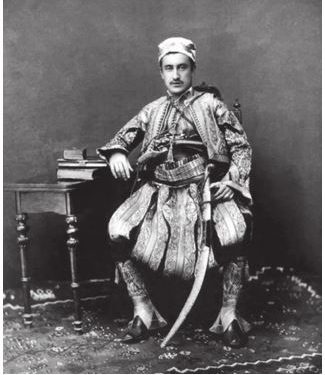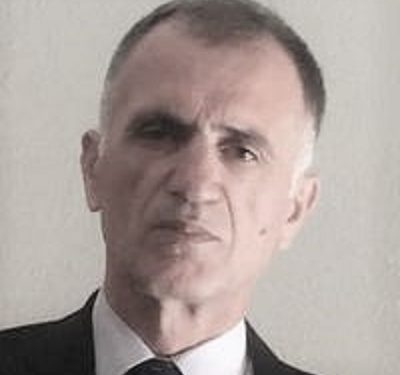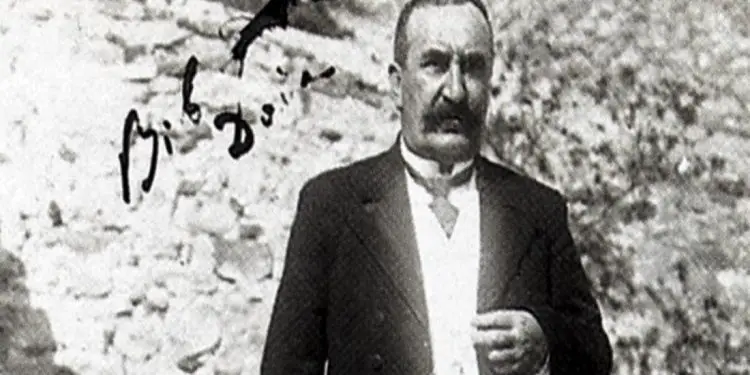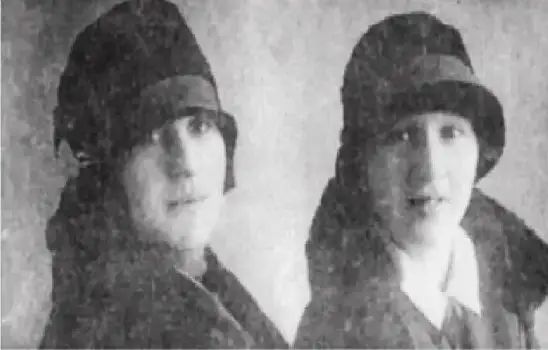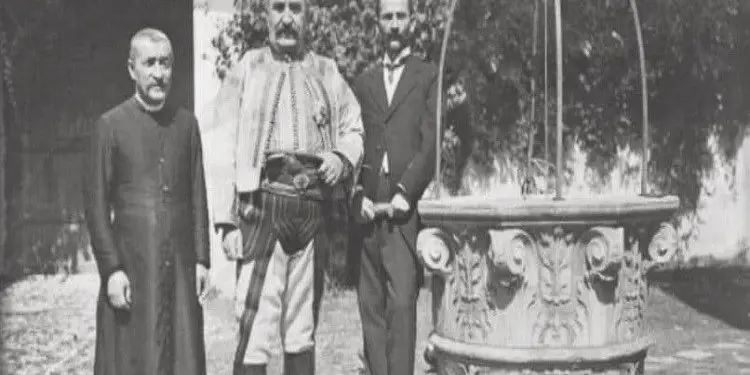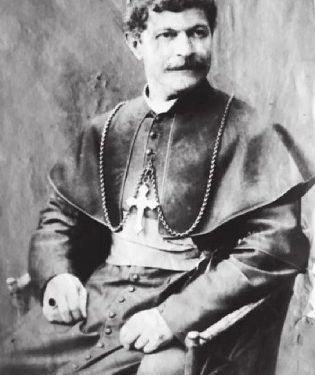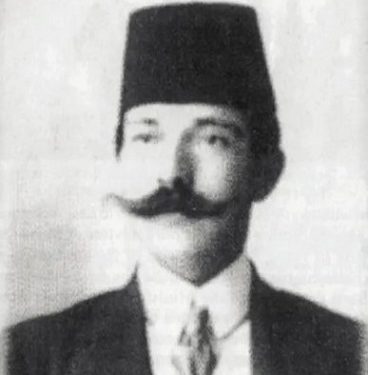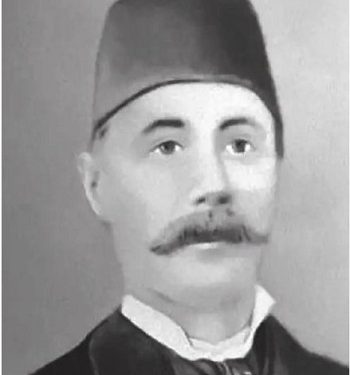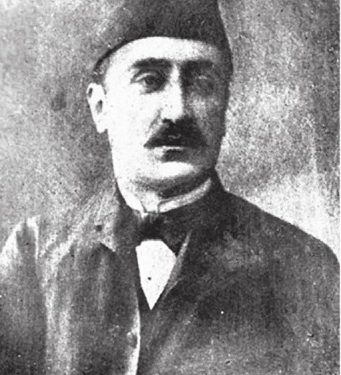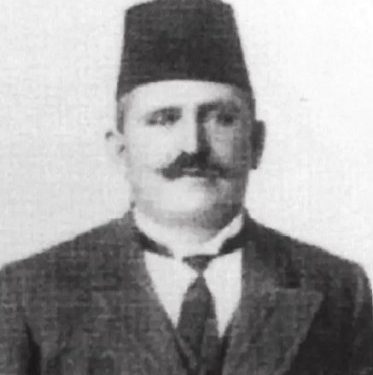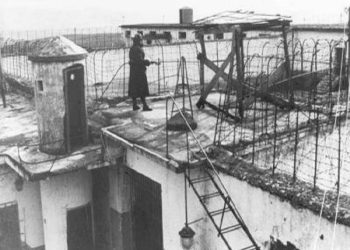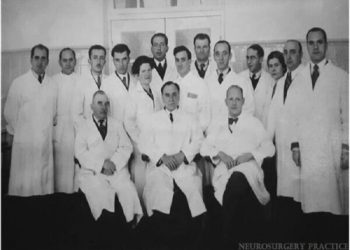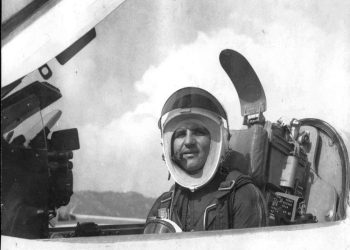By Dr. Nikol Loka
The tenth part
“PRENGA BIBE DODA, THE SHADOWS OF A CITIZENSHIP”
Memorie.al / The newest book “Prengë Bibë Doda, a phenomenon in Albanian political life”, by researcher Nikollë Loka, not only expands the scope of historical studies on Mirdita, the Door of Gjonmarkaj and the figure of the Mirdita Prince, Prengë Bibë Doda, but it is also a contribution to national historiography. The very rich archival material, the literature used or consulted, oral traditions, etc., make this book a real study treasure, giving the science of history a scientific monograph that enriches our knowledge of Mirdita, its captains, tradition, history etc. To study such an important and complex figure, as the figure of Prengë Biba Doda, is a high scientific responsibility that not everyone undertakes. Nikollë Loka, has done a great job of research and treatment by the professional researcher, giving us the portrait of the Prince and the general Mirditor, with the true contours. Dr. Loka has adhered to the end of the space and time, in which the multidimensional events and their protagonists have developed.
THE MONOGRAPH “ABOUT BIBË DODA, A PHENOMENON IN ALBANIAN POLITICAL LIFE”, A VALUABLE SCIENTIFIC STUDY THAT ENRICHS THE FUND OF OUR HISTORICAL STUDIES
(By Mr. Sc. Murat Ajvazi, March 2017, Switzerland)
Continues from last issue
Princess Margjelë, an extraordinary woman
Margjela e Bibë Doda, died in 1913 in Shkodër and was buried there. She was the woman who, with the dignity of a princess, was able to protect her son’s position and with it the legacy of Biba Doda for 37 consecutive years. Margjela was the female equivalent of her husband, equipped with the skill, intelligence and determination needed to lead. If formally, she did not get involved in self-government; her influence on the decisions made by the Mirditas was great, both through the leaders and her son.
Children of Bibd Doda
Prengë Bibë Doda was born in Orosh in 1858, but soon his father settled in Shkodër, so the boy grew up with the atmosphere of that city. However, the environment that surrounded the child was mixed: Mirditor and Shkodra, this double influence, accompanied Prenga throughout his life. In Shkodër, he received a selective education and had as his first teacher, the famous poet Leonardo de Martino, who was for some time the secretary of Biba Doda. (170)
Biba and Margjela also had a daughter, Dava, about whom it is written: “Dava sent her mother with her knowledge and wisdom. Dava had died during the earthquake of 1905, which caused many deaths and injuries in Shkodër”. (171)
Marta, adopted child of Margjela, sister of Kthella’s bajraktar, Llesh Prengë, who married Valiu’s doctor, Sadedin, also belonged to that family. (172) Aubrey Herbert, who had met her during the visit he made to Prenga Biba Doda in his house, writes about Marta: “There was also a young woman, a granddaughter, who spoke a very good European, dressed alla Franca”. (173)
Marta embroidered the first Albanian flag in 1903, when no one knew exactly what Skenderbeu’s emblem had been, a single or two-headed eagle! A local cleric brought it to him from Rome. In 1918, he led a women’s society in Shkodër. (174) she engaged in charity activities, in aid for cultural activities that took place in Shkodër, etc. Marta’s costume, along with Prenga’s costume, went like “fish” to Moscow. (Enver Hoxha gave it to Stalin as a gift, together with the sword of Preng Bib Doda. Memorie.al’s note). Now, of those clothes, only Marubi’s photographs remain. Her husband, Sadedin, was the grandson of Vali of Syria, who was also known by the name; Anton Kallmeti.
Prenga married Lucien, the daughter of Kolë Gjinaj (Xhuxha), Honorary Dragoman of the English Consulate in Shkodër, to whom he had been engaged for four years. Kola’s ancestors had come a hundred years ago from Djuxha e Mirdita. Kola had always worn a flat sun hat. He had many properties, many houses that he rented out, as well as vineyards in Bardhaj, a large garden near Kiri, which has been called the Dwarf’s garden; land in Fushë Firej. There were also large areas of land in Berdica and Beltojë. (175)
Ndoç Xhuxha, of this family, had participated in the national movement, as a member of the Istanbul Committee. He is the first Albanian philatelist. Prenga’s marriage to Lucien took place in September 1913. (176)
The marriage caused a great sensation in the city and in the diplomatic circles accredited there. The Austro-Hungarian consul announced to Vienna: “Prengë Pasha, married today the daughter of Nikollë Gjinaj. The marriage was celebrated in the church by Monsignor Serreqi, Reverend Monsignor Doçi, the Italian-Albanian professor, Zef Skiroi, who has been accompanying Prengë Pasha on trips for some time. (177)
With this act, the main argument of Prenga’s opponents, that you had to be married to get state functions, is overturned. The “New Albania” newspaper announces on the front page with an article; “for the marriage of His Excellency, Prengë Bibë Doda, with the excellent Lucie Gjinaj. Let them live and spend their lives white-faced and be inherited with joy for the good of Albania, as here is the door of honor, since in the old days, the famous door of theirs”. (178)
Then he continues with two congratulations: “I wish His Highness, Prince Prengë Bibi Doda, a marriage from the depths of my heart, for the honor and comfort of all Albania. They lived, enjoyed and inherited. (179)
I wish His Highness, Prince Prengë Bibi Doda, a marriage from the bottom of my heart, for the honor and comfort of all Albania. Let them live, enjoy and inherit, for the honor and kindness of our Motherland, as their fireplace is always here. (180)
Prenga and Lucia did not have children, as it is said that Prenga was sterilized in Istanbul, so that he would not leave descendants, with the intention of interrupting his hereditary line. Luchia, engaged in social and charity activities. She was the president of the “Principality of Our Lady of the Rosary”, at “Arra e Madhe” in Shkodër, an association made up of high-class Catholic women. (181)
The family of Prengë Bibë Doda faced tricks, pressures, evils of all kinds, but also with their own great name. Margjela and Dava in Shkodër, and Prenga in exile, were united around their historic mission: to preserve the right to the prey of Mirdita, never to abandon that people, who had overcome the greatest trials, remaining loyal to them until death.
A PHENOMENON IN ALBANIAN POLITICAL LIFE
How do they describe Prengë Bibi Doda?
“The captain from Mirdite, who is widely talked about, widely rumored, widely rumored, black and white, to be grafted on”.
Gjergj Fishta, “Malc’s Lute”
A lot has been said about Prenga Biba Doda, and perhaps instead of making a portrait of him, it is better to express the opinions of local and foreign personalities who knew him.
Aubrey Herbert includes Prengë Bibë Doda, along with Ismail Qemali and Esad Pasha, in the three most prominent personalities of Albania at that time. (182)
Gabriel Luis Jaray gives this description of the Prince of Mirdita: “Prengë Pasha lived for a long time in exile, abroad, in Asia Minor, where he was exiled by the Sultan, Abdyl Hamiti, who was under his influence. During the time of forced solitude, Prengë Pasha was equipped with culture and today he knows the French language and literature best. From the contact he has had with the affairs of Europe, he has benefited from such a breadth of thought, which one can also call skepticism, but he completely reconciles this with an obvious sadness, which made him fall to his knees. , before the Pope, when he was in Rome. Tall, a little plump, but agile, just past forty, with an oval and plump face, with brown hair and mustache, fair skin, with dark, mobile and twinkling eyes, Prengë Pasha, he is quite handsome. The reception he gave me is more than cordial, loving and almost family; he talks full of inspiration, and vividly confessing jumps from one issue to another. He is a conversationalist, tireless and never stops telling anecdotes of all kinds.
In him you see only vitality and life, which express a strong and sensitive nature. I seem to see him still, after we had dined, leaning on the arms of a sofa, with his legs outstretched, smoking with all his pleasure a cigarette and some never-ending glass, talking and telling stories, which he enlivens with his movements numerous of the head and hands. He is the nicest host and the most vivid reminiscer. Maybe he is a smart businessman and a smart diplomat, but Prengë Pasha gives you the impression of a joker in his personal life. While in public life, he is a man full of authority, fury and prestige”. (183)
Mehdi Frashëri has known Prenga closely. For that “Prengë Bibë Doda, he was a strange, smart and quite cultured personality. He thought that prudence was the best part of bravery and his stay outside of Albanian politics saved him from all jobs”. (184)
In the assessment of Eqrem bey Vlora, a synthesis of Prenga’s personality is given. According to him; “General Prengë Bibë Dodë Pasha, the hereditary captain of Mirdita, was one of the “smartest, most educated and most charming leaders of Albania at that time”. (185)
Nopça, writes that; “he also had a glass eye, which he hid from the mirditors”. (186)
The British Consul General, in Thessaloniki, Lamb, in one of his relación, gives this opinion about Prenga: “We must bear in mind that; Prengë Bibë Doda’s personality is not one of those who inspire interest, but his inherited influence in Mirdita, as a permanent and essential political actor in Upper Albania, made his attitude interesting”. (187)
Syrja Bej Vlora: “Prince Dodë Pasha – Prince (Preng Bib) Dodë Pasha, was a strong pillar of the Mirditors, an outstanding son of a noble and old family. With his tall stature, characteristic of the highlanders, and his sweet face, he was known and respected everywhere. With his fine mind, he pleased and made the whole circle happy. He had a lot of knowledge about Western literature, about the social life of the civilized world and knew the international situation. He did not like hypocrisy and did not trust any man. More than serious things, he liked jokes and jokes. He read and wrote Turkish, Italian, and French. He was always cheerful and smiling. He was good at words and conversation. The rumuses, which he told in the form of a joke, were so subtle and apt that a thousand other criticisms and explanations could not show that meaning. With Ismail Beu, it went well. Even with Esat Pasha, he did not seem to be an opponent.
- Bourcart, a French writer, in a work published recently, says: “Prince Bib Doda, has a strong and healthy body, has a fine intelligence.” Prengë Pasha was exiled in Kastamoni and for many years, removed the hardships of the Kurbet. But he never complained about suffering in life. He was glorified with the ranks he had received from the Ottoman Empire and always wore a red hat on his head. In Shkodër, during the General War, an Austrian colonel and a Hungarian major wanted to undermine this Ottoman appearance.
On this occasion, Bib Doda, spoke about the future of the war and addressed the Hungarian major: ‘I don’t understand why the Hungarians entered the war? If the Germans win, the Austrians will crush them; if the Germans can, the Hungarians will not be able to defend the national existence’. Prengë Dodë Pasha, although he did not do any important service to Albania, he was benevolent, wise and charitable, he was a faithful man, with an Albanian heart, he sacrificed himself for those he had friends with. He was grateful to me, because I had interceded for his release from Kastamonia, as well as for the payment of back wages”. (188)
From the newspaper; “XIX century”
“Prengë Bibë Dodë Pasha is one of the people who, in all the Albanian confusions, has been talked about less, but there is a possibility that sooner or later, his name will come out of silence. After the events of Vlora and Durrës, in fact he remains as the only important Albanian, intact, and it is not difficult for him to have an important role in the future government. Since he is a Christian and the head of the most powerful Christian tribe, this gives him a privileged position, and his experience with people and circumstances marks him out as a man of action.
A man in his fifties, taller than usual and more cunning than one might think, Prengë Bibë Doda, who dresses like a European or rather, an Allaturka with redingos and a fez, has on his face an impenetrable expression of cunning and his persistence and conversation, which he manages very skillfully, both in his own language and in our language, which is familiar to him, shows his culture, above the average, in Albania. He was born in Mirdita, in Orosh, that is, in one of the most inaccessible places in the highlands, from the Gjonmarkaj family. (189)
Prengë Bibë Doda, it is also mentioned for his culture, which he took into the family hearth, school halls and political salons. He showed his culture, not only by the deep knowledge he possessed, by the way he spoke, the foreign languages he possessed and others, but also by the fact that he had one of the largest libraries in the city of Shkodra. He was a collector and with his initiative, for the first time in 1880, it became possible for the Albanian collection of gold coins, collected by Ndoc Xhuxha, to be sent to the numismatic exhibition organized in the Vatican. The numismatist Kolë Gjinaj, Ndoc’s nephew, writes about Prenga as a philatelist and a learned man. Prenga, spoke Turkish, Arabic, the official language of the Ottoman Empire. He also knew French and Italian, to some extent, German as well. In his rich library, there were Italian and German books and magazines dealing with philatelic problems.
The numismatists linked him to Ndoc Djuxha, who later gave him his eldest daughter, Lucia. Around 1883-1885, it became possible to publish the first Albanian stamp in the Ottoman Empire. This was a single stamp, worth one piastre, considering that this is how much a Turkish stamp cost. The stamp circled with words; “Government Post of Mirdita”. In the middle, there was the double-headed eagle. It was reproduced by Marka Gjoni in 1921. Prengë Bibë Doda had a collection of stamps until 1919. When she was killed, they found a postcard with Mirdita’s first stamp. (190)
Wealth of a Prince
Prengë Biba Doda, unlike other Albanian nobles, did not own a large fortune. Initially, all wealth was concentrated in Orosh and consisted mainly of livestock. There was also a lot of land. Some residents used to deal with the land and collection against payment. They were considered privileged and looked upon with respect by the people. During the years 1858-1866, Bibë Doda bought land in Kallmet Lezhë, Dajç in Zadrima, two shops in Lezhë and a house in Shkodër. (191)
There are several purchase and sale documents that prove this: In a contract between the brothers Gurakuqi and Bibë Doda, it is about the sale of a piece of land in the city of Shkodra. (192)
Likewise, Kapidan Biba, bought land in Balldre. On January 31, 1893, the Kallmet church had released a plot of land to the Prince of Mirdita, near his forests. (193)
While in a sales document in Lezha, it is written: “The four named persons; Ndrekë Palë Mëhilli, Mëhill Kola, Mark Zefi and Lazër Jaku, declare that they sold Kapidan to Bibë Doda e Mirdita, a shop they have in the market of Lezha, for the value of 12,500 groshis. The signature is done with our desire”. (194)
Handcuffs had made the transaction of selling several properties: a house in Shkodër and a large field for agriculture between Lezha and Kakarrić. (195)
Palace of Biba Doda was among the most imposing buildings in Shkodër. During the siege of Shkodra by the Montenegrins, consul Zambaur’s wife and his children took shelter in Prengë Bibë Doda’s house, which was better able to withstand the bombings than the Austro-Hungarian Consulate. (196)
When the bombardments intensified, Consul Zambaur and the whole family stayed together with Margjela and Marta in the basement of the Palace, which was more protected. (197)
Jaray writes: “The palace of Prengë Bibë Doda in Shkodër, quite simple from the outside, inside is filled with expensive tapestries from Eastern countries, carpets from Asia Minor, carved furniture and rare weapons. (198)
Prenga, in an effort to stabilize its economic situation and to stop depending on foreign subsidies, committed itself to the sale of the Qaf-Molla forest. Although he, together with his wife, give donations for education, culture, to help orphans, etc., they still do not have the economic status, as befits their rank, because Gjonmarkaj did not collect taxes from the population, like other Albanian feudal lords .
Regardless of the need, the Bibë Doda family always donated to public services or to poor individuals. The newspaper “Bashkimi” of 1910 writes; “We know in the official notebook that, Prengë Bibë Dodë Pasha, there was a donation for the help of this club, 50 Napoleons and 500 other Napoleons were spoken to, but as soon as permission for a road came, he was begging own forests of Qafë-Molë and, up to Lesh. The road is necessary, to house the land and useful, for many other services…”! (199).
From the forests of Qafe Molla, he thought that he would derive great benefits. This economic transaction conditioned his political stance to some extent. On August 23, 1911, the Governor of Shkodra approved the request of Prengë Bibë Doda, for the use of the Qafë-Molë forest in Mirdita, for trade purposes. Prenga was connected to Italy, (200) where he thought to find buyers. Memorie.al
The next issue follows
- Robert Elsie, History of Albanian Literature, Tirana 1997
- Dom Ndoc Nikaj, Memories of a life…, p.17
- Franc Nopça, Travels through the Balkans, p.252
- Aubrey Herbert and the creation of today’s Albania, Diaries and letters 1904-1923, …, p.43
- Susan E. Pritchett Post, Women in Modern Albania: Firsthand Accounts of Culture and Conditions from Over 200 Interviews, McFarland & Company, 1998, p.116
- Kolë Shtjefni, Shkodra, My notes, “Shtjefni” publishing house, Shkodra 2005, p.38
- Pjeter Arbnori, Mirdita is a very special province, see; Mirdita, Interview II, publications “Mirdita”, Tirana 2004, p.40
- HHStA-PA-A-Vj, Telegram, Ref.I, V.No.256, September 3, 1913
- New Albania, No. 18, 7 dated 1913, p. 1
- Karlo Suma, New Albania, No. 18,7 dated 1913, p.3
- Mirash Luca with sons, New Albania, No. 18,7 dated 1913, p.3
- Kumona e Djella, 29 January 1942
- Aubrey Herbert and the creation of today’s Albania, Diaries and letters 1904-1923, … p.259
- Gabriel Louis Jaray, Unknown Albania. (In the new Kingdom of the Albanians), publishing house “Knowledge” 2006, p.64-65.
- Mehdi Frashëri, Memories (1913-1933), “OMSCA-1” Publishing House, Tirana 2005
- Eqrem Bej Vlora, Memories, “House of Books and Communication”, Tirana 2003, p.290
- Franc Baron Nopça, Travels through the Balkans, … p. 207
- FO. 195 /2406, doc.No 2813/74 Report of Consul General Lamb to Sir Gerad Lowther in Thessaloniki, January 11, 1912, p.257-259
- Syrja Vlora, Esad Pasha was full of revenge and tricks, “Shqiptarja.com” newspaper, July 5, 2013
- Newspaper “Sekuli XIX”, dated February 8, 1914, with the title “Mirditas and their prince”.
- Kolë Gjinaj, Prengë Bibë Doda’s first step in Albanian philately, the first international seminar “Shkodra in the Centuries”, June 22-23, 1993, Shkodër 1994, p.442
- AQSH, Bibë Doda fund, file 8, doc. No. 1 and 2.
- AQSH, Bibë Doda Fund, File 15, p. 1
- Prengë Bibë Doda Fund, File 13, p.1
- AQSH, Bibë Doda Fund, File 15, p.18
- HHStA-PA-A, Year 24-41-4102, Telegram from the Pehskopi of Sapa in Shkodër to Rappaport in Vienna “On the sale of some properties of Prengë Bibë Doda”, Shkodër 191 4
- Hortense von Zambaur, The Encirclement of Shkodra, Publications “Camaj-Pipa”, Shkodra 2006, p.62
- Hortense von Zambaur, The Siege of Shkodra,… p.89
- Gabriel Louis Jaray, Unknown Albania. …, p. 64-65.
- Newspaper “Bashkimi”, July 17, 1910, No. 29.
- AQSH, Fund; Prengë Bibë Doda, File 13, p.1-5




